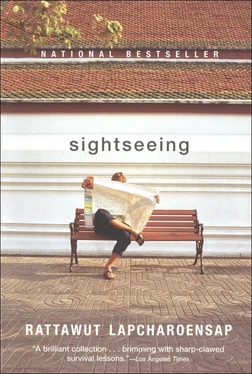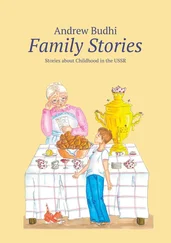She stopped laughing, frowned, pointed an accusing finger at us both. “Leave my mother alone,” she said sternly in Thai, her tiny voice echoing around the pool. “No more rocks.” Dong and I exchanged glances. We didn’t know she could speak Thai. We’d seen her around the housing development with the other Cambodians, but they’d always spoken to each other in that gibberish.
“I don’t know what you’re talking about,” Dong said, rubbing his head with the heel of his palm.
“Don’t lie,” she answered. I glimpsed her teeth again. I thought about pirates. “I’ll kill you next time. I’m not kidding, guys.”
“Okay,” Dong said, shrugging, getting on his bike. He started riding in large swooping circles, the chain creaking noisily, the wheels singing beneath him. “Sure. Whatever, girlie.” She stared at us impassively, watched Dong gliding along the bottom of the pool. “You speak pretty good Thai,” I said after a while. “What’s your name?”
Dong shot me an incredulous look from his bike.
“Priscilla,” she said almost sheepishly, fingering the hem of her T-shirt.
“Some name for a refugee,” I replied, laughing. “That’s not a Cambodian name. That’s a farang name.”
She opened her mouth as if she might explain. But then she turned around and started walking away. “Just don’t do it again,” she said as she went through the unpainted gate. “No more rocks. My mama doesn’t like it.”
She’d been gone for all of ten minutes when Dong and I climbed up the pool ladder, fished the bike out, and started making our way toward the railroad tracks.
“Did you see her teeth?”
“Yeah,” Dong said. “She’s a freak.”
A thin strand of smoke curled out of Priscilla’s shack. Somebody was cooking inside. We stood on the railroad ties, grabbed a few choice rocks, felt their cold, lovely heft in our hands. “Bombs away,” Dong said, winking.
The first rock elicited no response. But as soon as the second one rang the corrugated roof, Priscilla emerged from the house like an angry little boar, fists at her sides, nostrils flared, bushwhacking her way through the knoll separating the train tracks from the Cambodians’ shanty. I saw her contorted face, started laughing, started sprinting. But halfway back to the road, I noticed Dong wasn’t running beside me.
I turned around. That tiny Cambodian girl had Dong pinned facedown to the railroad ties. She sat on his back while he bucked and thrashed beneath her like a rodeo horse. She yelled at him, pummeled the back of his head repeatedly with her hands. I thought about leaving him there. But then I remembered that the girl had said she was going to kill us, and I suddenly didn’t know how serious Cambodians were when they said something like that, even if the Cambodian was just a little girl. She could’ve been Khmer Rouge — a term Mother and Father always mentioned in stern voices when they complained about the refugees — although I only understood at the time that Khmer Rouge was a bad thing like cancer was a bad thing. Khmer Rouge probably made you bald and pale and impossibly skinny, and Khmer Rouge probably made you cough up vile gray-green globs of shit like Uncle Sutichai when we visited him at the hospital every Sunday. If that little girl had Khmer Rouge, I certainly didn’t want Dong to get it too.
Dong looked at me helplessly when I arrived. Priscilla had both his arms pinned to the earth with her feet. “Dude,” he pleaded. “Do something.”
“Say you’re sorry!” Priscilla screamed. Dong grunted, struggled some more in vain. She didn’t notice I was there. “Say you’re sorry!” she screamed again, hitting Dong’s head a few more times, the sound flat and dull.
I touched her shoulder. Priscilla turned around and hit me so quick in the face that I fell back stunned. She got off Dong, leapt toward me like a little panther. She bared her golden teeth and for a second I was afraid she might bite me. But she just started hitting my head with her palms. I raised my arms for protection, her blows short and stinging, but I also found myself laughing the whole time, taken aback by the intensity of the little girl’s rage.
“Apologize!” she screamed again and again and again.
“Okay, okay,” I managed to say after a while. “Sorry. You win. Mercy already.”
“God, girlie,” Dong said, getting up, wiping the dirt from his pants with both hands. “Give peace a chance.”
She stopped. She looked at us both. “I told you I’d kill you,” she said proudly, crossing her arms. And then she reached out and punched Dong in the shoulder. “Fuck,” Dong said, flinching. “All right already. You know, it’s a good thing you’re a girl because—”
“You didn’t say sorry,” she interrupted him sternly. Dong rubbed his shoulder with a hand. She raised her fists again.
“Okay,” he grunted. “Sorry. Happy now?”
“No,” she said. “Now I want you to say sorry to my mama.”
“No way,” I said.
“Fuck no,” said Dong, shaking his head, but Priscilla had already yelled something in Cambodian toward the shack and her mother was already walking slowly across the knoll, wiping her hands on a greasy apron.
Priscilla’s mother was the shortest woman I’d ever seen, barely a head taller than us, with a face as flat as an omelet, wide black unreflective eyes, and a man’s broad shoulders. Her teeth weren’t gold like her daughter’s. They were just slightly crooked, a bit yellow, boring and regular. Priscilla said something else to her in Cambodian. Her mother nodded, scowling at us silently the whole time. “Say you’re sorry,” Priscilla said in Thai.
Dong looked at me. I looked at Dong.
“Do it,” she said, her face creasing into a severe frown. “Or I’ll beat you again.”
“Sorry,” we finally said in unison, staring at each other’s feet. Priscilla’s mother kept on scowling at us. I thought she’d start barking in Cambodian. I thought we might even discover what ungodly thing she’d meant to do with that rusted shovel. She’d probably bury us alive, I thought. I got ready to run. But instead Priscilla’s mother just reached out and slapped us lightly on the back of our heads. And then, to our surprise, she smiled at us broadly — a genuine smile — before saying something to Priscilla. And then she walked back down to the shack.
Priscilla eyed us curiously, picked at her golden teeth with a pinky nail, as if deciding what to do with us.
“Can we go now?” Dong asked.
“If you want,” Priscilla said, shrugging. “Unless you guys want something to eat.”
That was the beginning of a nice thing. We never threw rocks at her house again. Although Dong continued to insist that we hadn’t fought back because Priscilla was just a little girl, I think we both knew there was little we could’ve done that afternoon to beat back her angry advances. She was so pissed off it was the purest expression of fury I’d ever witnessed aside from the night Mother took a broomstick to a gigantic rat that had been raiding our trash.
So we didn’t mind when Priscilla showed up at the pool the next morning. We gladly took her in. The three of us would horse around aimlessly down there, wasting those bright summer days. That’s when Priscilla told us about her father and her teeth. That’s when Dong and I would look into her mouth and tell her she was rich.
We initiated Priscilla to the simple pleasures of a normal, non-refugee-camp summer. We introduced her to ice cream. We bought a kite and flew it from the bottom of the pool. We took her to a movie at the cheap theater in Onnut — a horror movie about some witch living by a canal — and Priscilla gripped me so hard during the frightening parts that I discovered tiny bruises on my forearms when we got out. We even taught her how to ride a bike. The first time she got going on her own, zoomed down the slope to the deep end, she screamed so loud you could almost feel the pool’s porcelain walls vibrate.
Читать дальше











